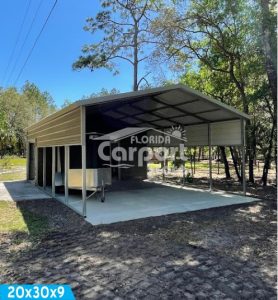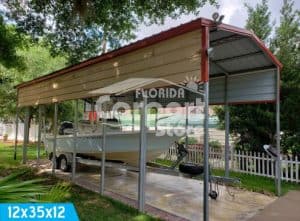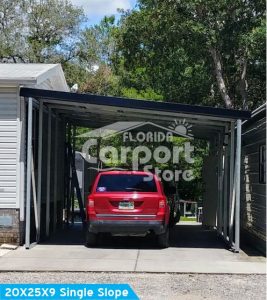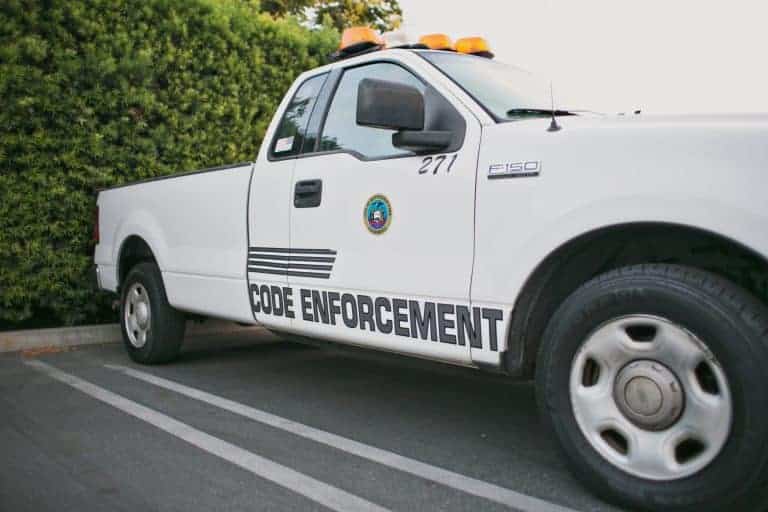Permitting for carports and steel buildings involves obtaining the necessary approvals from local authorities before construction can begin. This process ensures that the structures adhere to zoning regulations, building codes, and safety standards. Proper permitting is crucial to avoid legal issues and ensure the structural integrity of these additions.
Some of the items usually include:



The easiest way for our customers to get a permit is to have it done by a professional. Permit Geeks can get all the required information and make the job easy.
Generally, yes, you can get your own Carport permit as an Owner Builder. If you feel comfortable navigating the permitting process you can find the information from the municipality where you live. We have linked below to several Florida Cities and Counties for information on their Carport permitting

Don’t pull out your hair trying to figure out all that is required for your Carport permit. Let the professionals who do it every day do it for you!
Our goal is to make the Carport purchasing experience simple, easy, and friendly.
You may have come across some Carport sellers who say you don’t need to get a permit for a Carport when you most likely must get a permit. Their interest is not in you or your purchase, but their own pocketbook. Technically, they are correct in that you do not need to have a permit to BUY a Carport from them, but you will need the permit to LEGALLY INSTALL the Carport. Think like this: You don’t need a driver’s license to BUY a vehicle, but you may not DRIVE the vehicle on public roads without a valid driver’s license.
Carport sellers want to sell Carports. To some Carport sellers, obtaining, or waiting for a buyer to obtain a permit could slow down the sale process. Understand it is much easier for a salesperson to tell you that you don’t need a permit, and you unwittingly buy the Carport from them. Therefore, if any salesperson says you DO need a permit, they are most likely the person to trust.

Some dealers may not want to alert buyers to the fact that they may need a Carport permit because the buyer may not want to pay the costs associated with the permitting.
Ultimately, the Carport seller will not incur any problems if the customer does not get a permit for the Carport purchased from them, because it is the homeowner’s responsibility, not the seller’s, to get the permit.
If a Carport retailer is selling a “Florida DCA Approved Carport”, then the building structure is inspected at the factory by licensed engineers while it is built, who are regulated at the state level. The local building department is required to accept these approved buildings if they meet certain criteria. Furthermore, the Florida Building Code states that if a building is under 400 square feet and is DCA Approved, it can be installed by anyone, without a license. If the Carport is over 400 square feet, or if it comes in multiple sections, it must be installed by a licensed contractor.
So, the unscrupulous Carport seller can sell you a Carport without you obtaining the required permits and have it “installed” by anyone with a truck or trailer that can move it. If you don’t get the Carport permit, they still made the sale, but it is solely your problem if you didn’t get the required permits.
You can choose to get permits one of two ways:
If you want us to pull the permits under our Florida Certified Contractor License, we can do it for you. If you feel you can take on the task yourself and are comfortable with the accompanying liability, we can apply to get your permit as Owner Builder.
Some will say because the government wants more money. Not really. It is a safety issue. Living in Florida can be dangerous due to pesky meteorological phenomonons called hurricanes, as well as tropical afternoon summer thunderstorms. In 1993 Hurricane Andrew devastated southeast Florida. It was after this disaster that Florida put serious teeth into the Florida Building Code. You could basically say if the wind touches it, the Building Code addresses it. And, since Carports are predominantly outdoors, and relatively small, Carports must be designed and installed in such a manner that they will be able to withstand certain wind loads and not become one large projectile, or break into several smaller projectiles during a storm.
Cities and counties have varying price structures for Carport permit costs. Some can be as low as $25-30, others can run up to several hundred dollars. The cost of a Carport permit is determined by the municipality fee structure.
Some municipalities charge a standard amount of $15 to $25, and others may charge a fee based on the overall cost of the Carport . For example, the Carport permit cost might be $10 per $1,000 of cost. So, the cost of a Carport permit application fee for a $3,000 Carport would be about $30.
Contacting a knowledgeable source about Carport permits in your area is the best way to determine the cost of a Carport permit. If you don’t know upfront, it is best to be prepared when you go to apply for the permit.
It is important to understand that having an Agricultural Exemption is NOT the same as having Agricultural Zoning.
We have heard many people say they have AG property. When asked if it is Ag zoning or Ag Exempt, they don’t know the difference. We then assume that is is not AG Exempt, because getting Ag Exempt can be difficult, and those who have gotten the Ag Exemption KNOW they got it! Mainly from the hassle, they would go through to get and maintain an Ag Exemption.
You will need to contact your municipality to determine what the requirements are for Ag Emempt property.
If Carports are required to have a permit and one is installed without a permit, municipalities have code enforcement departments to deal with such matters. Most locales in Florida will require a permit to be obtained for the unpermitted Carportor removal of the structure. Fines and penalties on top of the permit costs can also be assessed. Home Owner Associations also could have fines, penalties, and other measures they can take to “cure” the non-conforming structure.
Another issue to consider when not getting a Carport permit is insurance. Homeowners’ policies could exclude any “non-permitted” structures from insurance coverage that were required to have a permit for installation. So, if you do not obtain a permit, the structure, as well as the contents, may not be insured. This is something to consider with your insurance agent

We provide a diverse range of carport styles tailored to your needs. From standard carports for everyday vehicles to spacious RV carports and enclosed metal building and utility carports for multi-purpose storage, we have options that suit Florida’s climate and your preferences.
When determining the ideal height for your carport, it’s advisable to make the legs approximately one foot taller than the height of the tallest vehicle you anticipate owning. It’s essential to factor in additional elements like roll bars, top racks, and RV AC units when measuring for height.
Keep in mind that if you decide to enclose the gables of your carport, the clearance will be slightly reduced by approximately three inches compared to the leg height. For instance, if your carport’s legs measure 7 feet, the resulting clearance would be around 6 feet 9 inches.
Alternatively, if you opt to keep the gables open, the highest clearance point will be at the center brace, near the roof’s peak. This location provides a clearance that’s about 18 inches higher than the leg height. From the top brace, the roof frame gradually tapers down to a height close to the legs on each side. So, if your carport has 7-foot legs, you can comfortably park a slightly taller vehicle underneath, as long as you avoid positioning it too close to the sides.
The height of the carport or building is the height of the eave wall studs on the sides of the structure.
Absolutely! We offer a cutting-edge 3D Metal Building Carport Design tool that lets you customize various aspects, including roof design, doors, windows, colors, and more. You can design your carport to match your unique taste and needs.
Getting a personalized quote is easy! Simply fill out our online form with your specifications, and we’ll provide you with a transparent and accurate estimate. Also, you can call and speak with a rep who can work with you designing your building online in real time. This empowers you to make an informed decision based on your requirements.
Yes, we provide access to flexible financing solutions to make your purchase process hassle-free. Our financing applications are simple, and we offer options like Rent To Own and 30 / 60 / 90 Days Same As Cash to suit your preferences.
Florida Carport Store is here to help you in your carport installation decisions. Consider accessibility, weather exposure, property layout, and local regulations when choosing the placement. Contact Florida Carport Store and speak with a knowledgeable and helpful associate to help navigate your location questions.
Absolutely. Once your order is confirmed, you have the option to request engineer plans for your structure.
Securing permits ensures that your carport adheres to local building codes and regulations, ensuring its structural integrity and safety. It protects your investment and the well-being of those who use the carport. We collaborate with PermitGeeks.com to streamline the permit acquisition process for your convenience.
The roof pitch is a 3/12 pitch.
No, we will not connect the carports or metal garages to your residence, edifice, or any other building. To properly set them up, we require a clearance of at least 3 feet on all sides of open carports and metal garages.
ere are some standard dimensions for single and double carports:
One approach to determine the ideal size for your carport is to park two of your vehicles side by side and measure the width required to comfortably open all doors on both cars.
For instances where you need space for a single car and an additional vehicle such as a motorcycle or lawnmower, an 18′-wide carport should suffice. But if your setup involves a car alongside a truck or SUV, choosing this size could result in car doors bumping into other vehicles or the carport’s steel tubing.
When considering two smaller, compact cars, a carport measuring at least 20×20 is recommended. If you’re interested in a fully enclosed carport with two garage doors, a 20×20 garage is the smallest size that accommodates two garage doors.
Moving up to a slightly more spacious option is the 22×20 double carport, providing that extra breathing room. The largest double carport size available is the 24×20, ideal for accommodating two larger vehicles
The regular style is the most economical and showcases the curved eave on the roof to the sides.
Both the boxed eave and vertical styles share a similar appearance, with the difference lying in the orientation of the roof sheeting. In the boxed eave style, the sheeting runs parallel to the length, while in the vertical roof style, the sheeting runs vertically. This vertical arrangement allows rain, and debris to easily slide off the roof.
The vertical roof style stands out as the sturdiest. To achieve the vertical orientation of the roof sheeting, the design incorporates metal purlins or hat channels to which the sheeting is attached to the trusses. This additional structural support enhances the strength of the vertical style. However, it’s worth noting that due to the materials used and the increased construction time, the vertical roof style is the most costly among the three options.
Indeed, we offer the option of tailoring the size of a carport or metal garage to your preferences. However, please note that the pricing structure involves charging the customer the cost of the next larger standard-sized structure. For instance, if you require a carport that is 17′ wide, and the available standard widths are 12′ and 18′, the pricing would be based on an 18′-wide carport. This same guideline applies to the length as well. If your desired length is 24′ but the standard 25′ length is excessive, we can adjust it to 24′; nevertheless, the pricing would reflect that of a 25′-long carport. It’s important to consider that when we specify a length of 25′, this measurement doesn’t encompass the 6″ overhang on the front and back. While the base length is 25′, the actual roof length is 26′.
The narrowest available metal garage or carport size is 10′ wide, and it would be priced as if it were a 12′ wide structure.
Providing Metal Carports, Steel Buildings, Metal Buildings, Metal Garages, and Steel Garages in Florida, includingAlachua, Altoona, Alachua, Anthony, Apopka, Archer, Astor, Bell, Belleview, Beverly Hills, Brandon, Bronson, Brooksville, Bushnell, Center Hill, Chiefland, Citra, Citrus Park, Citrus Springs, Clermont, Cocoa, Coral Springs, Crystal River, Cross City, Dade City, Daytona, Deland, Deltona, Dunnellon, Eustis, Flagler Beach, Fort McCoy, Fort Myers, Fruitland Park, Gainesville, Groveland, Hawthorne, High Springs, Haines City, Haines City, Hawthorne, Holiday, Homosassa, Hudson, Inverness, Jacksonville, Kissimmee, Lady Lake, Lake City, Lake Wales, Lakeland, Land O Lakes, Largo, Lecanto, Leesburg, Live Oak, Lutz, Mascotte, Masaryktown, Middleburg, Morriston, Mt. Dora, New Port Richey, Newberry, North Port, Ocala, Ocala National Forest, Odessa, Old Town, Oldsmar, Orlando, Ormond Beach, Ocala, Palm Bay, Palm Coast, Palatka, Pinellas Park, Pine Ridge, Pierson, Plant City, Riverview, San Antonio, Sanford, Silver Springs, Sparr, Spring Hill, St. Augustine, St. Cloud, St. Petersburg, Starke, Sugarmill Woods, Summerfield, Tallahassee, Tampa, Tavares, Temple Terrace, Titusville, Trenton, Umatilla, Valrico, Valrico, Weirsdale, Wesley Chapel, Weeki Wachee, Wildwood, Williston, Winter Haven, Zephyrhills.